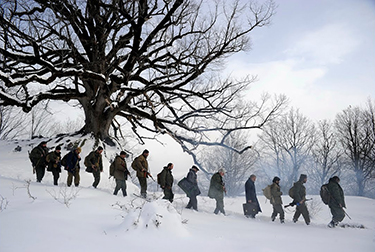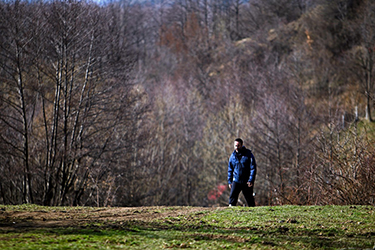Festivals Cottbus: 27th Film Festival of East European Cinema, 2017
The woods and the trees
|
The 27th Film Festival of East European Cinema, eagerly awaited by many, frowned upon by some. Fittingly for this city between park and woods, forests featured prominently in many films. In Khibula, George Ovashvili's third picture, we see Georgia’s first democratically elected president Zviad Gamsakhurdia and his group of men take refuge in the woods after he has been ousted by a military coup. In almost every house and hut they take shelter in they are welcomed by his supporters, but their enemies trail them and they must push on, deeper into the woods, their numbers slowly diminishing. Shots are heard but cannot be located. The mountains and trees have a stark outline against the clear mountain air, contrasting Gamsakhurdia's complex situation. Some of the dreamlike quality must stem from my ignorance of Georgian history - the better informed can search for more direct allusions, but the ending is open to viewers of all levels of knowledge. Knowledge is one of the central themes in Maciej Pieprzyca's Jestem mordercą (I'm a Killer). When murdered women are found in a forest in the south of Poland, the hunt for the country's first serial killer begins. This being the seventies, the police not only have their own more or less brilliant minds to rely on, but also a computer. Soon, an arrest is made, but how much of this success is based on hard facts? The bleak outlook on humanity, the horrible instances of misogyny even on the side of the righteous, and the masterful art direction by Joanna Anastazja Wójcik create a believably disgusting universe. Forests become dangerous, every tree threatening in the theme of children getting lost. In three movies I saw frantic parents running through the woods, searching for their kids. In Andrey Zvyagintsev's Nelyubov (Loveless), tracking shots become so suspenseful that I actually had to remind myself that in Leviathan the most dramatic discoveries happen off-camera. Pola and her younger sister in Edyta Rembała's short Pola run off to the woods when her mother leaves to work abroad. At first, her plan seems to work... The director shows a flair for atmosphere and talent to direct her actors, old and young. Ewa, the young mother in Anna Jadowska's Dzikie róże (Wild roses) goes to the forest to pick rosehips, but in a distracted moment loses sight of one of her children. The neighbors in her village are ready to help, but they have also been ready to judge her. The director deals with complicated emotions and relationships and knows how to let silences speak. There is a lot of pain in this movie, but you'll want to see it again. Aik Karapetian looks at the role of the father in Pirmdzimtais (Firstborn). How far is his protagonist willing to go in order to protect his wife and their future son? |
He follows her assailant into the woods to confront him, but that doesn't solve his problem. Trees become so menacing that when his wife buys a lamp with branch-and-leaf-design for the baby's room, converting it into a shadow forest, you fear for its safety. Pomegranate trees are the link between a grandfather, father, and son in Ilgar Najaf's Nar baği (The Pomegranate Orchard), a story inspired by some of the most famous trees in literature, the ones from Chekhov's Cherry Orchard. Should grandfather Shamil sell them in order to support his prodigal son. Will his grandson have a better life among the trees or faraway with his father in Moscow? Beautifully shot by Ayhan Salar, you want to step into the picture to hold back disaster or just to enjoy the view. Sometimes you only need one tree, as in Anna Arevshatyan's Bari Luys (Good Morning). The problem is, some need this specific tree in a residential area in Yerevan in winter for firewood, some need it in summer for its fruit. For journalist Arshak, every tree becomes the madeleine that takes him to this particular one, now gone, and his childhood memories. The film itself wants to be too much, collapsing under the timelines, the flashbacks, the sprawl. Less than 1 hour 50 minutes would have been much more, a typical first film mistake. But now the director has got it out of her system, I am eager to see what she does next.
Trees are in abundance in Emanuel Pârvu's Meda sau partea nu prea fericita a lucrurilor(Meda or the not so bright side of things). But access to the woods is restricted: widower Doru's traps are illegal and his work as lumberjack is tightly regulated by "tree-huggers" and their quotas. Environmentalists here come across as enemy of the locals, although enough locals come across as each others' enemies as well. I vowed never to use the over-used term "heartbreaking", but I cannot find another word for Daru's quest to earn money, to sell his livestock, or to beg his in-laws, all in order to pay his taxes and be able to care for his foster child. At the end he can count on no one, he has only the forest to sustain him. Sadly, his trials bring the words of Count Pückler to mind, the landscape architect of Branitz: "Money and power can do almost anything, but no Croesus, no Alexander can resurrect the mighty thousand year old oak once the poor labourer has felled it." Alexandra Pütter http://www.pueckler-museum.eu/park-und-schloss/fuerst-pueckler.html
|


 Follow me, dear reader, follow me to little Cottbus, close to the German-Polish border, nestled between the biosphere reserve Spree Forest on one side and castle Branitz with its famous park on the other side. Here, the locals have a rustic charm, as shown for example by the gherkin-peddler, who sells the regional speciality of pickled gherkins. "Did you pickle them yourself?" I asked him. "No, I am standing here all day, aren't I?", he shot back. "Normally we are in front of the town hall, but because of the festival..." Ah, the festival!
Follow me, dear reader, follow me to little Cottbus, close to the German-Polish border, nestled between the biosphere reserve Spree Forest on one side and castle Branitz with its famous park on the other side. Here, the locals have a rustic charm, as shown for example by the gherkin-peddler, who sells the regional speciality of pickled gherkins. "Did you pickle them yourself?" I asked him. "No, I am standing here all day, aren't I?", he shot back. "Normally we are in front of the town hall, but because of the festival..." Ah, the festival!